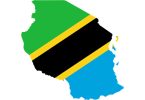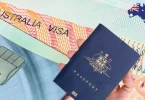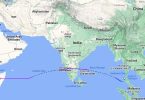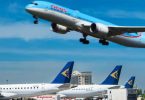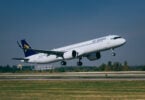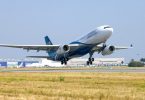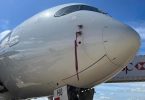Emirates, the Arab world’s biggest airline, will raise fares from Tuesday as oil market speculation sends fuel costs soaring, the Dubai flag carrier said in a statement.
An Emirates spokesperson told Arabian Business that the airline had raised ticket prices, but the increase would “differ by markets and routes.”
“Like every commercially-oriented business, Emirates regularly reviews its fares to reflect market dynamics including demand and rising fuel prices.” she said. “We have an active fuel risk management programme but with such market volatility it is impossible to fully absorb the impact of soaring oil prices.”
Other airlines in the region, including Royal Jordanian, have not announced changes in fares.
RJ “already adds a fuel surcharge to the fares to some of its sectors, according to the fuel prices in the international market. However, at the time being no changes in the fare prices are applied,” the airline’s media director, Basel Kilani, told Arabian Business.
Regional airlines have been severely affected by political turbulence in countries like Egypt, Yemen and Libya. Dubai-based Emirates cut its flight frequency from 13 flights weekly to Cairo to seven weekly, in the wake of uprisings in the Arab country.
Carriers including Royal Jordanian, Emirates and British Airways have halted flights to Libya.
The turmoil in Libya, which pumps nearly two percent of world oil output, sent Brent crude prices above $108 a barrel to a two and a half year high on Monday.
“Assuming the situation continues, the oil prices are expected to touch $115 to $120 per barrel within the next two weeks, which would result in losses for global airlines for the current year,” said John Siddharth, an industry analyst for the South Asia and Middle East at Frost & Sullivan.
The International Air Transport Association on Wednesday said the Middle East had seen an 8.2 percent rise in passenger traffic in January, compared to the previous month, but warned carriers would be “very challenged” by rising oil prices.
“The region’s instability has sent oil prices skyrocketing,” said Giovanni Bisignani, IATA’s Director General and CEO. “Our current forecast is based on an average annual oil price of $84 per barrel [Brent]. Today the price is over $100. For each dollar it increases, the industry is challenged to recover $1.6bn in additional costs.
“With $598bn in revenues, $9.1bn in profits and a profit margin of just 1.5 percent, even with good news on traffic 2011 is starting out as a very challenging year for airlines,” he said.



